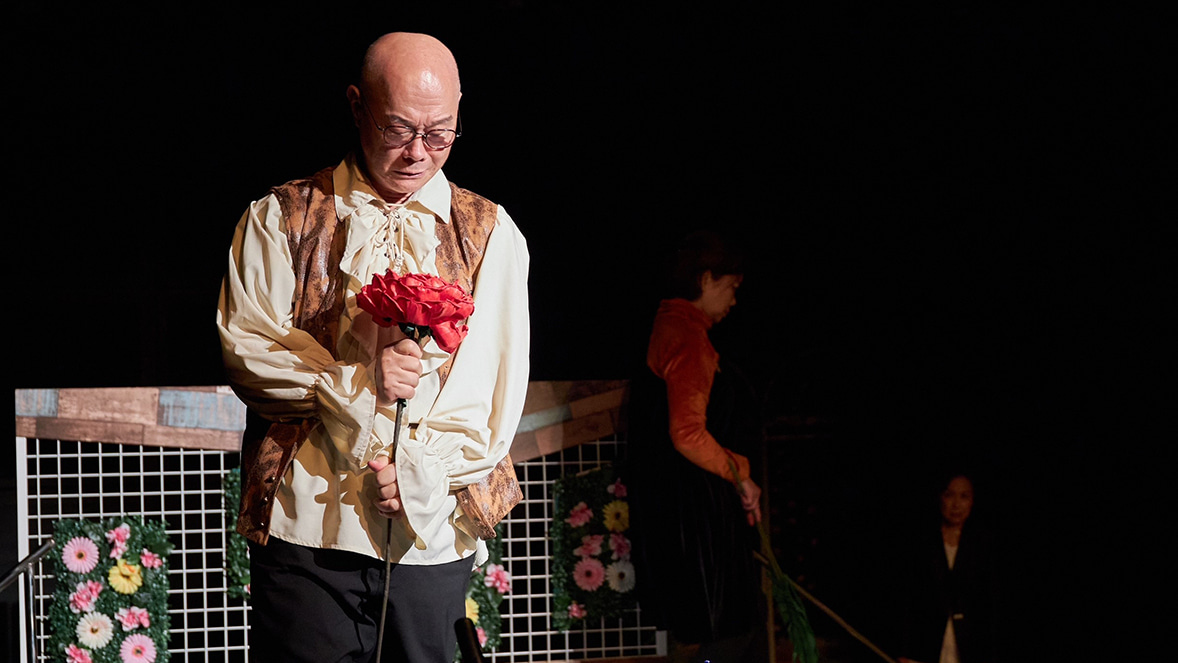
Founded by Arts’ Options and sponsored by Link Together Initiatives, “Inspirational Drama Programme for Elderly” last August premiered its adaptation of Shakespeare’s love tragedy Romeo & Juliet. Titled “LOmeo & JulieYip Shake up Shakespeare,” the play depicts the lives of two elderlies with a focus on their interaction with family and care home housemates. It is a story about communication barriers between generations. Berthold Chung plays LOmeo, one of the protagonists. A novice to the performing arts, he impresses audience with his subtle acting, stage movement, professionalism, and chemistry with other actors. In real life, Berthold is a recovering cancer patient who has been given encouragement by his drama teachers and fellow students to focus on the positive side of life.
A retired secondary school principal, Berthold sees a close connection between his work as an educator, and his talent and interest in dramatic art. “I’ve always enjoyed speaking and expressing myself. To me, good teachers are someone who are able to immerse themselves into the performance. That’s the key to helping students fully absorb the material.” Though he also enjoys the cinema and Cantonese opera, the theatre remains Berthold’s one true love. He is particularly drawn by the “zero distance” between actors and audience. “During filming, shots can always be retaken,” he said. “Actors in Cantonese opera tend to follow a fixed formula. What fascinates me most about drama is that everything is done live and right in front of the audience, while the content is very close to real life.” When he saw the recruitment brochure for the programme, he didn’t have to think long before signing up.
Since the day he got involved in the play, Berthold has undergone intensive dramatic training – from fundamental acting skills to scripting to backstage operation. The lessons gave him a more thorough understanding of performing arts. The most interesting part, he found, is about working with other actors. “Dramatic art is also the art of teamwork. Let’s say that you are a great actor. If your counterpart can’t connect with you and there’s no chemistry, then none of your personal talent would really matter.” Every actor has his or her ups and downs, so much of it is also about adjusting to different situations and scenario. To Berthold, this is what makes the theatre fascinating.
But just when his post-retirement life got a much-needed boost from the play, it was rocked by another news - his diagnosis of nasopharynx cancer at the beginning of the second year of the Inspirational Drama Programme for Elderly. “It felt like my world has ended,” he said. “But my family, and my teacher and classmate from the drama classes have given me tremendous support and encouragement.” As he had to limit his activities as a result of the condition, Berthold had no choice but to give up some of the classes, such as Cantonese Opera. He did, however, stick with the drama programme. “I had to treasure this rare opportunity and try my best to finish the full two-year course as it has given me so much satisfaction and a lot of friendships. It is where I find the motivation to beat cancer!”
After learning of Berthold’s illness, both teachers and fellow students went out of their way to ensure that he got the “special treatment”— meaning that he could fulfil his role in the play and look after his body at the same time. “After treatment there were all sorts of side effects. During rehearsals, the teacher would try to arrange for my parts to go first so that I could leave early.” On the set, they would also provide chairs for him to rest on, while his wife could also stick around to look after him. All these made the troupe felt like a second family to Berthold.
Other than continuing to take part in the rehearsal, during treatment, Berthold also insisted on sharing his story of battling cancer with the audience through five sessions of solo performance “The Road to Shu” in the programme’s public performance “New Sage Player 22”, which he also directed and wrote.
“The fact that I can perform now means that there’s still hope!” The theatre allows Berthold to see his conditions in a more positive way. Through acting, he hopes to gather more knowledge about dramatic art, so that one day, when he is no longer acting, he can still stay involved with what he love either as a critic or script-writer.